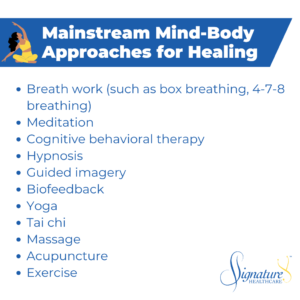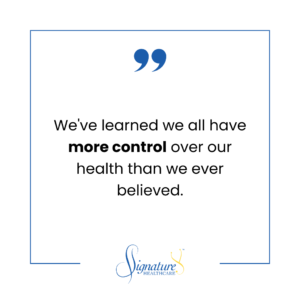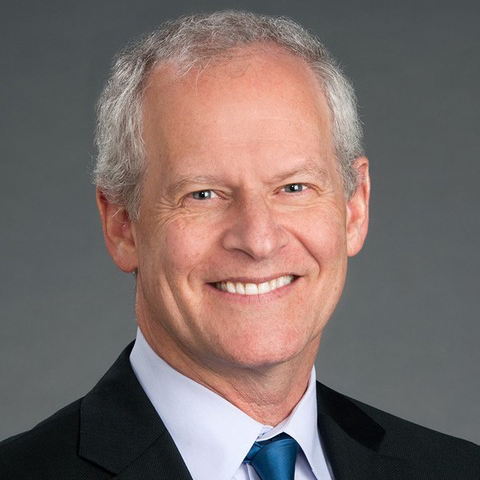The Power of Mind-Body Therapy in Healthcare Today
Did you know yoga was introduced to the U.S. in the late 19th century?
It was considered a religious practice until the 1960s when, through the appeal of television, America became aware of yoga’s mind-body potential — the potential to increase flexibility and strength, decrease stress, lessen chronic pain, and more.
Today, many other mind-body therapies hold the same potential power, especially when integrated with traditional Western medicine, to improve our quality of life.
The Importance of Belief
An essential mind-body connection exists whenever a patient and physician sit together, engaged in a successful therapeutic relationship. The connection comes from values acknowledged and respected and their ability to trust and believe in one another.
Interestingly, that shared sense of belief can influence how well prescribed therapies work.
Case in point: Perhaps the doctor prescribes a blood pressure medication; fundamentally, it’ll work as prescribed. But our belief in that treatment — our confidence in the physician’s judgment and trust in the power of the medication — contribute to its effectiveness as well.
For example, if your doctor says, “Your blood pressure’s a little high. Try this medicine, and we’ll see what happens.” The medication may work.
But consider if the doctor takes the time and care to fully engage your belief system:
“In your specific circumstances, I believe this medication may be beneficial. Here’s why. Here’s how to take it. Here’s what I believe the outcome will be. Here’s when we’ll confirm it’s working exactly as it should. Do you have questions for me?”
It’s the same prescription, but a different relationship is forged there, one reinforcing belief. The initial belief system plays a significant role in the outcome of almost any treatment or therapy.
The Mind-Body Connection
As a medical student in the 1980s, I was taught that a mind-body interface wasn’t actually possible — that the body existed on one plane and the mind, emotions, and spirit on another. Mental conditions carried a certain stigma and weren’t discussed in conjunction with physical ailments.
In recent years, our awareness has greatly evolved. We now know (and teach young doctors) that the human body is a “system of systems,” all interrelated.
Case in point:
- Physicians understand that when an individual is anxious or “blue,” they may manifest very real physical symptoms — stomach upset, headache, insomnia.
- Or take the patient who manages stress by playing a game of golf each weekend with friends. If sudden lower-back pain prevents them from playing, they may have not just pain but also “blues” or anxiety when they can’t get together with friends.
We learned a lot from the COVID pandemic: It normalized how emotions, moods, cognition, and mental health impact bodily health and well-being. We saw how effects on mind and body can play off one another, sometimes worsening in a vicious cycle.
The good news is that if we can calm or energize the mind, mood, and spirit, we often help refresh and restore our physical body as well.
Mind-body therapies help us tap into this connection and our innate healing ability.

What Is Mind-Body Therapy?
What’s considered mind-body therapy? The definition is admittedly quite loose. Some therapies might focus initially on the mind, others on the body. Still, each responds to beneficial interaction with the other.
Here is a sampling of mainstream mind-body approaches that carry the potential power of healing energy:
- Breath work (such as box breathing, 4-7-8 breathing)
- Meditation
- Cognitive behavioral therapy
- Hypnosis
- Guided imagery
- Biofeedback
- Yoga
- Tai chi
- Massage
- Acupuncture
- Exercise
In past decades, the mind-body connection was something patients — particularly women — understood and often tried to express. Physicians and researchers didn’t take heed, feeling there was no real evidence to support it.
But when the medical community finally started looking at the mind-body connection through the lens of science, it was clear: What patients had told us for years was valid. Physical health can deteriorate if we don’t acknowledge the state of our emotions.
Research is overwhelmingly positive that we can apply mind-body therapy — tap into our minds, emotions, and cognitive abilities — to approach our challenges differently and help our bodies heal. When patients adopt a positive attitude and feel empowered about their health and well-being, we observe the difference in body markers, in bloodwork, or in scans.
We’ve learned we all have more control over our health than we ever believed.

Who Benefits From Mind-Body Therapy?
Even today, many traditional-care doctors remain unaware that mind-body supportive data exists or don’t have the time in their packed schedules to explore it.
But in integrative medicine, we factor the mind-body connection into what we do. Why? Essentially, it allows each patient to actively participate in their care.
Mind-body therapy can benefit a patient as a stand-alone practice or as a complement to traditional medicine. Every patient has unique needs: One may do well with meditation, another with hypnosis. It’s about applying the right therapy in the right situation.
An integrative medicine specialist will guide you by asking:
- What are you most interested in?
- What are your belief systems and your values?
- How do you feel you can best contribute to your health and well-being?
- How can we get you started on a therapy that supports those things?
Mind-body therapy rarely takes the place of a specific medication or treatment. Clearly, meditation isn’t the answer for someone with pneumonia or yoga for a broken arm.
But a thoughtful, holistic program can serve you at your moment of need, whether non-urgent, urgent, or even emergent. It can help medical interventions be more successful, give you a better outcome, maybe help lessen medication, or even eliminate the need for treatment over time, depending on your circumstances.
Seek Mind-Body Therapy in Charlotte
Perhaps you live in the Charlotte area, and a friend recommends that you check out mindful meditation. Or you find information online about clinical hypnosis, tai chi, or any other mind-body therapy that sparks your interest.
You think, “Maybe I should try this.” Then, due to your search, you’re inundated with ads and articles from businesses or clinics trying to cash in on the buzz from the latest research — all claiming they “do it best.” But not every mind-body therapy advertised on the internet or TV is appropriate for everyone; if not applied carefully, some may even cause harm.
That’s when it’s time to consult a trusted medical professional in the Charlotte area. Bring the information you gather to your primary care doctor — or ideally, to an integrative medicine or whole health practitioner well-versed in making sense of mind-body therapy claims.
Case in point: Suppose you have aches and pains, flexibility challenges, or stress, and a friend encourages you to find relief in yoga. However, there are many types of yoga classes. Should you choose vinyasa, hot yoga, or Bikram?
I typically recommend anyone new to yoga meet with a trained yoga therapist, who can help determine their personal and health goals and any medical concerns that may limit the postures they try.
For example, suppose you were recently diagnosed with high blood pressure, and it’s not yet regulated. In that case, avoid inverted yoga poses that place your head below your heart. Your yoga practitioner may not know that, but a yoga therapist will.
Meeting with a specialist saves you time, keeps you safe, and guides you to get the most benefit from the mind-body therapy you choose, particularly if it complements the traditional medical care you’re receiving.
Show Yourself Kindness
We know the Charlotte community at Signature Healthcare and expertly recommend credible, safe mind-body therapy options in this region. We make informed referrals to specialists and other professionals we know personally across the mind-body spectrum, ranging from yoga therapy to tai chi to cognitive behavioral therapy for insomnia (CBT-I).
Is it time to devote some attention to your emotional balance? Are you considering a gentle exploration of mind-body therapy?
Show yourself this kindness to benefit your overall health and well-being. Reach out, and we’ll help you.

Dr. Russ Greenfield
Dr. Greenfield was among the first physicians to train under the direct guidance of Dr. Andrew Weil and has been practicing Integrative Medicine for over 25 years. He is Board Certified in Emergency Medicine and Lifestyle Medicine.

